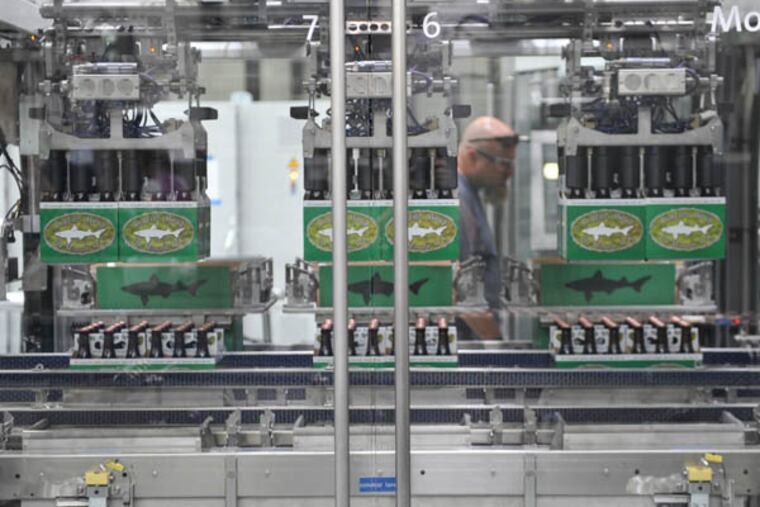Dogfish Head merger with Boston Beer makes sense, say some Philly brewers
The deal, announced Thursday afternoon, will bring Jim Koch’s Boston Beer and Sam Calagione’s Dogfish Head under one larger entity, combining two of the largest craft beer makers in the nation.

The craft beer world was rocked Thursday with the news that Delaware’s Dogfish Head Brewery is merging with Boston Beer, makers of Samuel Adams, in a deal valued at $300 million. But while some craft beer drinkers may have recoiled at the news, some craft beer makers said they aren’t exactly surprised.
The deal, announced Thursday afternoon, will bring Jim Koch’s Boston Beer and Sam Calagione’s Dogfish Head under one larger entity, combining two of the largest craft beer makers in the nation. (Boston Beer is the second-largest craft brewer in the U.S., behind Yuengling. Dogfish Head is No. 13.) Both companies will retain their status as craft brewers by the Brewers Association’s definition, which requires that craft companies brew less than six million barrels of beer annually, and have less than 25 percent ownership by a “beverage alcohol industry member that is not itself a craft brewer.”
The merger was initially announced on social media, where reaction was swift and often negative.
Hope this is a joke. A collaboration would be cool not a merger
— Jesse Van Meter (@joeykookamyer) May 9, 2019
— B Matty (@dogfish60ipa) May 10, 2019
The merger announcement comes at a time when other midsize breweries are pursuing similar deals. Downingtown’s Victory Brewing Company, for example, combined with Southern Tier Brewing Company in 2016 to form Artisinal Brewing Ventures, a joint entity managed by a New York-based private-equity firm. Prompted by financial issues, Weyerbacher Brewing, based in Easton, Pa., sought a partnership with a Philly-based investment group, but filed for bankruptcy last month as part of restructuring. As Calagione pointed out in a statement addressing Dogfish’s merger with Boston Beer, there are more than a dozen examples of smaller breweries being “sold to international conglomerates.”
But for Yards Brewing Company’s Tom Kehoe, this deal is a little different, in that it is “brewer on brewer,” and one of the first times we’ve seen “one craft brewer buying another.”
While he says he understands the sense that the deal is “taking away [Dogfish’s] innocence,” he added that it might be smart just to wait and see what happens, considering that the merger secures Calagione a spot on Boston Beer’s board, as well as 406,000 shares of the company’s stock. That move will make Calagione and his wife, Mariah, the largest shareholders behind founder Koch.
“I like to think it was Dogfish that bought Sam Adams, in a sense,” Kehoe says. “Sam is younger and better looking [than Koch], and he will be running that company before you know it. You have two icons, and when one is ready to say, ‘Hey, I’m going to step away,’ the other can step in. I’d rather Dogfish get bought by Boston Beer than not be around, or get bought out by an investment banker.”
Instead, Kehoe is “happy for those guys” at Dogfish and Boston Beer, even though he “never thought it would happen.” The move, he adds, may have been inevitable following Dogfish’s 2015 sale of 15 percent of the company to private equity firm LNK Partners.
Kehoe says he has little interest in pursuing a similar deal with Yards, at least right now. Yards, he says, has received offers in the past, but hasn’t accepted any “expensive money” from investors because “we like the way we are.”
“If I ended up selling out, what would I do with myself?” he says. “I’m doing what I love right now. Ten years from now it might be an idea, but I am not thinking that way at all.”
Nancy Rigberg, co-owner of Home Sweet Homebrew, agreed with Kehoe’s take on the deal. Calagione got his start with Dogfish in the 1990s in part at the Rittenhouse homebrew shop, which provided some of the ingredients for the first “10 batches of Dogfish beer,” as the now-legendary brewer told the Inquirer in 2012.
“People are complaining, ‘I’ll never drink Dogfish again.’ Get off your high horse on this one,” Rigberg says. “There’s a real difference between powerhouse breweries merging and still retaining independence, and ones like Ballast Point or Wicked Weed selling out to [AB InBev].”
The move makes sense, Rigberg adds, considering the competition that midsize brewers like Dogfish and Boston Beer face, both from the cadre of smaller, local breweries (there are more than 7,000 craft beer companies in the US currently), and international conglomerates like AB InBev, Heineken, and Molson Coors Brewing. Jockeying for distribution, shelf space, and tap handles has created a “difficult market,” that requires collaboration for survival.
Boston Beer and Dogfish’s merging provides an edge, Rigberg says, because the pair’s core products don’t have much overlap. Boston Beer, for example, has made a name for itself outside of beer with brands like Angry Orchard, which makes hard cider, and Truly Hard Seltzer. Dogfish, meanwhile, is known for hoppy IPAs like its perennially successful 60 Minute IPA, and session sours, like SeaQuench Ale.
“Sam Adams’ core products aren’t really beer anymore,” Rigberg says. “Dogfish’s are. In a sense, [Boston Beer] created their own competition and have lost that kind of edgy relevancy. The fact that they can get that back with Dogfish, good for them.”